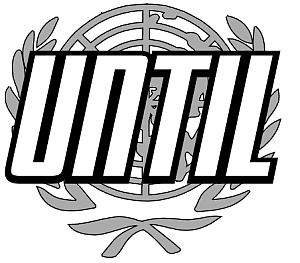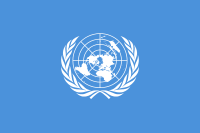Difference between revisions of "UNTIL"
m |
FrozenViolet (Talk | contribs) m |
||
| Line 17: | Line 17: | ||
UNTIL played a key role in many events over the next decades co-ordinating and working with established superhero teams on many occasions. In the 60's they fought back invasions from Lemurians, Sirians, and Atlanteans. With the increasing super crime in the 70's UNTIL came into direct conflict with such infamous names as Plague, the Griffin, Dark Seraph, a Gadroon invasion and the debut of Doctor Destroyer. | UNTIL played a key role in many events over the next decades co-ordinating and working with established superhero teams on many occasions. In the 60's they fought back invasions from Lemurians, Sirians, and Atlanteans. With the increasing super crime in the 70's UNTIL came into direct conflict with such infamous names as Plague, the Griffin, Dark Seraph, a Gadroon invasion and the debut of Doctor Destroyer. | ||
The 80's were a bad time for UNTIL, scandals and information leaks lowered their reputation with the public and politicians, and a change in leadership at the UN lead to large scale budget cuts. They remained a global presence however, and the superhuman problem was one that no country could afford to ignore. | The 80's were a bad time for UNTIL, scandals and information leaks lowered their reputation with the public and politicians, and a change in leadership at the UN lead to large scale budget cuts. They remained a global presence however, and the superhuman problem was one that no country could afford to ignore. | ||
| − | UNTILs resurgence began in the early 90's with the Battle of Detroit, and their acceptance by the United States. Planetary threats such as the invasion by Istvatha V'Han, Gravitar, and a renewed Dark Seraph with the Crowns of Krim gave them wins and losses that further formed to shape the organization. | + | UNTILs resurgence began in the early 90's with the Battle of Detroit, and their acceptance by the United States. Planetary threats such as the invasion by [[Istvatha V'Han]], [[Gravitar]], and a renewed [[Dark Seraph]] with the Crowns of Krim gave them wins and losses that further formed to shape the organization. |
<h1><p style="font-family:times;color:Silver">Notable Exceptions</p></h1> | <h1><p style="font-family:times;color:Silver">Notable Exceptions</p></h1> | ||
Revision as of 21:39, 2 April 2014
 For Heroes and Villains with a UNTIL connection see Category:UNTIL
For Heroes and Villains with a UNTIL connection see Category:UNTIL
Contents
[hide]Origins
Although Superhumans were known to the world before the founding of the United Nations in 1946, it wasn't until the increasing spread of Superpowers in the early 1950's that it became a cause for concern for the general public. Several nations were worried about the use of superhumans in national armies, and this was an issue debated frequently over the next decade.
Secretary-General Trygve Lie appointed Drake Wilson (the costumed hero Optimus) in 1950 to become the first Advisor of Superhuman Affairs. By the end of the 50's ( a decade that saw the first openly acknowledged superhuman military units), Drake Wilson had proposed an official UN institute to study 'the social effects of superhuman powers on society, specifically focussing on superhuman crime'. However this never made it to the General Assembly for a vote. Teaming with another supporter of the idea, Major Juan Martinez, it took until January 12, 1963 for the General Assembly to authorize the creation of a superhuman commission - the United Nations Tribunal on International Law. Their primary responsibility was to study how superhumans affect society and world security, and how the world should respond to the challenges they presented.
The Tribunal began with a hugely controversial goal: that the UN should establish global police force that would have the authority to enter the territory of any UN member who signed up, for the purposes of dealing with superhuman crime and related matters of global security. This task force would not employ superhumans, but instead relied on highly trained agents equipped with cutting-edge technology. Martinez, Wilson, and other members of the fledgling Tribunal presented their case with such passion and conviction, and one by one the nations of the world became convinced the idea would work.
1960's - Present
UNTIL played a key role in many events over the next decades co-ordinating and working with established superhero teams on many occasions. In the 60's they fought back invasions from Lemurians, Sirians, and Atlanteans. With the increasing super crime in the 70's UNTIL came into direct conflict with such infamous names as Plague, the Griffin, Dark Seraph, a Gadroon invasion and the debut of Doctor Destroyer. The 80's were a bad time for UNTIL, scandals and information leaks lowered their reputation with the public and politicians, and a change in leadership at the UN lead to large scale budget cuts. They remained a global presence however, and the superhuman problem was one that no country could afford to ignore. UNTILs resurgence began in the early 90's with the Battle of Detroit, and their acceptance by the United States. Planetary threats such as the invasion by Istvatha V'Han, Gravitar, and a renewed Dark Seraph with the Crowns of Krim gave them wins and losses that further formed to shape the organization.
Notable Exceptions
The United States, Soviet Union, and China refused to sign the UNTIL charter, and thereby refused UNTIL forces access to their territory without prior permission. Between 1965 and 1979 UNTIL was only allowed to operate on US soil twice. China was determined to rely solely on its own state superteam the Tiger Squad, and the Soviet Union refused to discuss any superhuman activity within their borders. These exceptions came to a tragic conclusion in July 1992, when Dr Destroyer attacked the city of Detroit. UNTIL was denied permission to enter the United States, despite being the leading authority on, and having an entire research division dedicated to, Doctor Destroyer. Public anger at the ineffective actions of PRIMUS, and the subsequent help UNTIL forces were in the aftermath, lead to the United States signing the treaty in 1993.
Known Employee's
- Secretary-Marshall Wilhelm Carl Eckhardt (the overall leader of the organization)
- the Under-secretary Jeffrey Bristol (the Secretary-Marshall's chief assistant)
- the Field Marshall David Ben-Israel (the commander of UNTILs field agents)
Sub Divisions
UNTIL Special Projects
Vehicles and Equipment
About the Seventh Imperative
U.N.T.I.L. is the world’s largest international police organization, with 188 member countries. It facilitates cross-border police co-operation, and supports and assists all organizations, authorities and services whose mission is to prevent or combat international crime.
U.N.T.I.L. aims to facilitate international police co-operation even where diplomatic relations do not exist between particular countries. Action is taken within the limits of existing laws in different countries and in the spirit of the Universal Declaration of Human Rights. U.N.T.I.L.’s constitution prohibits ‘any intervention or activities of a political, military, religious or racial character.’
U.N.T.I.L.'s six priority crime areas
The Seventh Imperative
Any time one of the above crimes involves superhuman, metahuman, mutant, or other advanced persons or entities, police and governmants in all member countries remand that case to U.N.T.I.L.
OOC Corner
Some of the original credit for the posted information goes to User Monkeyhead here at PRIMUS Database. Part of this Information is reposted from their original post at Ides_of_March.
